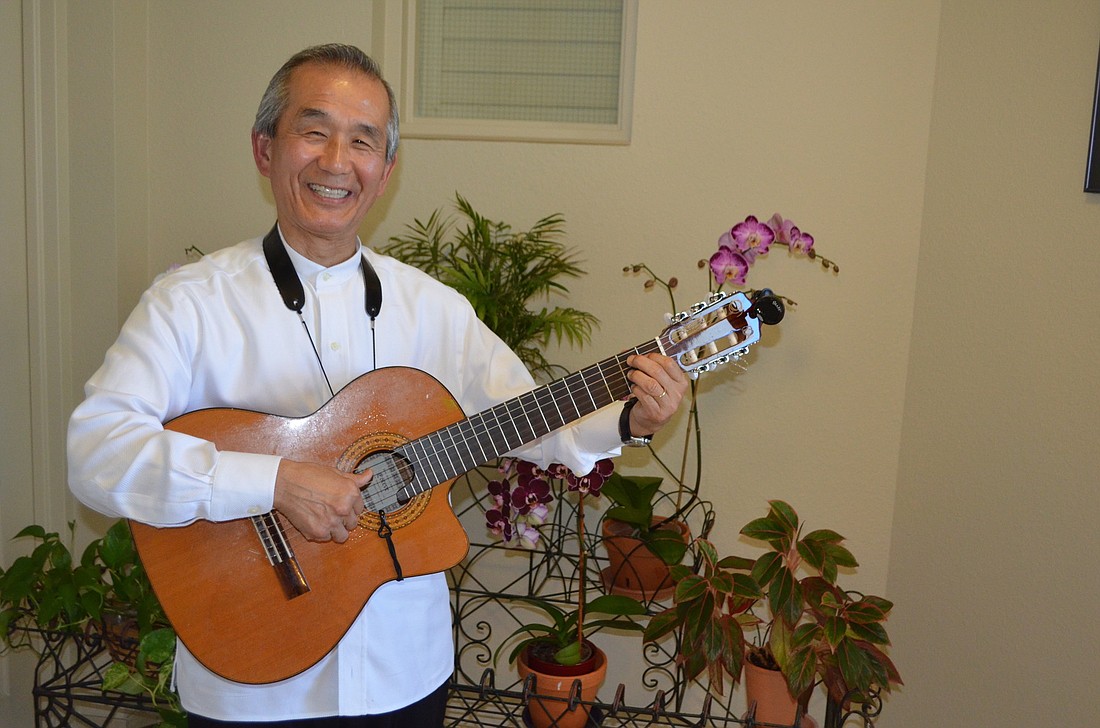- April 23, 2024
-
-
Loading

Loading

Yusuke Horiguchi gave up on speaking Spanish after a few months of classes.
It was the late 1980s, and he was working for the International Monetary Fund (IMF). Latin America was in the midst of its debt crisis, and Horiguchi was required to take a Spanish class. Then, he bumped into two Columbian friends and asked them,“¿Cómo estás?”
They didn’t understand; Horiguchi’s wife, Oya had to translate.
“I told my senior people, ‘I have absolutely no aptitude to learn that language,’” Horiguchi said. “They agreed with me that it was a waste of time.”
The Japan native and Marina Bay resident never learned to speak Spanish — only to sing it. At 71 and semi-retired, he has been performing bolero music, a romantic Latino style of music, for more than five decades. He doesn’t know the meaning of the words he sings, but he knows what the songs mean.
“In bolero music, there are not many themes,” he said. “They’re always about love that was lost…I can imagine, basically, what the songs are about, but in terms of details, I have very little idea.”
He listens to a song over and over, then transcribes it phonetically into Japanese to learn it by heart. The process can take six months to perfect a song to the extent that he is comfortable performing it for a crowd.
Horiguchi was a teenager when he and his younger brothers first heard the Latin American trio Los Panchos play in Tokyo. The group’s music became a sensation in Japan, and Horiguchi and his brothers saw the trio in concert two or three times a year. His brother later announced that he had taught himself to play guitar. So, Horiguchi and their other brother followed suit and taught themselves, eventually forming their own trio that played at parties.
“You know, despite the fact that we have very little idea about what is being said in those song lyrics, I think that the melodies are very beautiful,” he said.
But for most of his life, his career left little time for music. After earning his Ph.D. from Rice University, he taught economics before taking a position with Organisation for Economic Co-operation and Development (OECD). He went on to work for the IMF from 1978 to 2002, becoming its Asia and Pacific Department director, and after that, chief economist of the Institute of International Finance Inc. The work was high-pressure, but Horiguchi found time to perform on occasion, often at office parties.
Longboat Key resident Armando Linde, a Cuba native who also retired from the IMF, remembers Horaguchi performing at parties.
“He’s very good,” Linde said. “It’s funny because when he sings, he doesn’t have an accent.”
Now semi-retired, Horiguchi has more time for music. He still writes papers and advises companies, so he devotes the morning to economics — but from mid-day on, he focuses on his music. He plays from 7 to 10:30 p.m. Tuesdays at 15 South on St. Armands Circle as part of the Café de Romance that also includes the duo Nic & Ari and French chansons by Michelet Innocent, and he plays from 6 to 8 p.m. Sundays at Darwin’s on 4th restaurant in Sarasota.
A one-man bolero performer is unusual. Typically, a trio performs boleros, with one person playing lead guitar on a requinto and second and third guitarists who play regular guitars. The third guitarist is also the lead tenor, but all three performers sing.
Horiguchi was part of a trio with his brothers as a young man in Japan and admits he is more self-conscious now that he is a solo act.
“Now, I do three peoples’ music by myself,” he said. “It’s quite taxing.”
Although he worries about getting chords right and whether he will miss a note, he has never taken a guitar lesson — and has no plans to do so in the future. Instead, he prefers to embrace every performing experience.
Horiguchi does not know where his second career as a solo bolero performer will take him — but he is OK with improvising.
"I will make up a path as I go along,” he said. “When a way stops opening up for me despite my efforts, that I should take as a sign that my career as a musician, as I now conceive it, is coming close to an end.”
Contact Robin Hartill at [email protected]